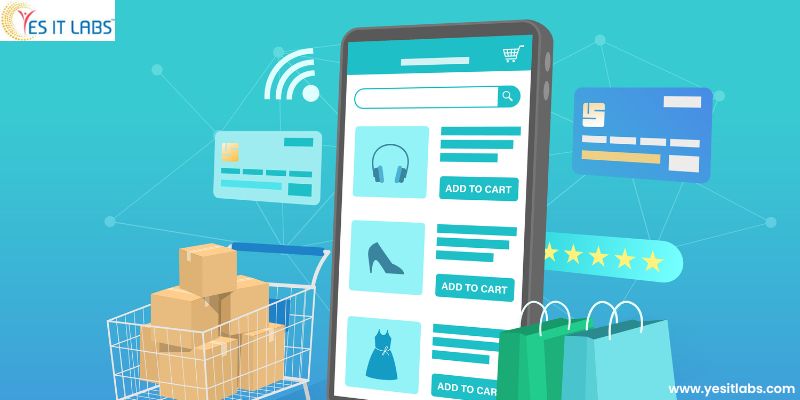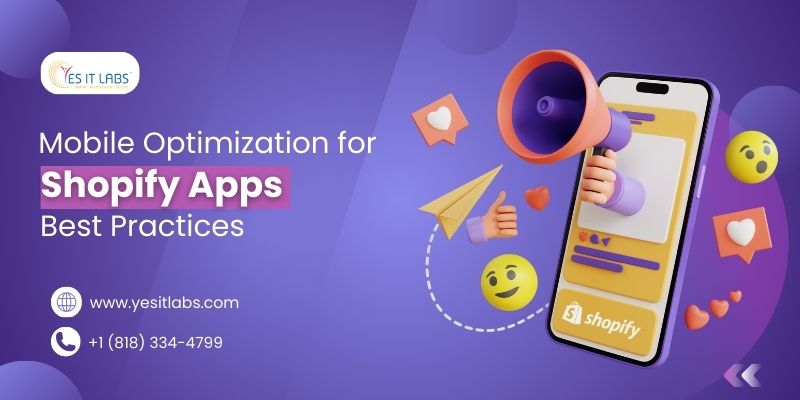
 By Alexis Bell
By Alexis Bell The Advantages of Shopify Apps for Efficient E-commerce Management
E-commerce has revolutionized how we shop, making it possible to purchase everything from groceries to gadgets from the comfort of our homes. The e-commerce industry is booming in the USA, with more businesses joining the digital marketplace every day. According to the U.S. Department of Commerce, e-commerce sales in the United States reached over $791 billion in 2020, and this upward trend shows no sign of slowing down.
With the rapid growth of e-commerce, the competition among online businesses has intensified. To stand out and succeed in this competitive landscape, efficient management tools are essential. This is where Shopify comes in. As one of the leading e-commerce platforms, Shopify provides a comprehensive solution for setting up and managing online stores. One of the key advantages of Shopify is its extensive app ecosystem, which offers a range of tools to streamline operations, enhance customer experiences, boost marketing efforts, and gain valuable insights. Let’s take a closer look at how these apps can transform your e-commerce management.
Section 1: Streamlining Operations

From managing inventory to processing orders and handling shipping, running an e-commerce business requires a lot of repetitive tasks. These tasks, while essential, can be time-consuming and prone to errors if done manually. Shopify apps can automate many of these daily operations, saving you time and reducing errors.
Inventory Management
E-commerce businesses require effective inventory management. Stockouts can lead to lost sales while overstocking ties up capital and storage space. Apps like Stocky and TradeGecko (now QuickBooks Commerce) provide robust inventory management options for Shopify users. These apps help keep track of inventory levels in real-time, alerting you when it’s time to reorder and even predicting future stock needs based on sales data. They can also manage inventory across multiple sales channels, ensuring that you always have the right amount of stock available.
Order Processing
Order processing can be a complex task, especially as your business grows. Automating this process can save a significant amount of time and reduce the risk of errors. Apps such as Order Printer and Oberlo streamline order processing by automatically printing packing slips and labels or handling dropshipping. Oberlo, for example, allows you to easily import products from suppliers directly into your Shopify store and fulfill orders with just a few clicks. This automation ensures that orders are processed quickly and accurately, enhancing customer satisfaction.
Shipping
Shipping is another critical aspect of e-commerce operations. Efficient shipping processes can improve customer satisfaction and reduce operational costs. Develop Shopify apps like ShipStation and AfterShip to simplify the shipping process by integrating with multiple carriers, offering real-time tracking, and providing shipping updates to customers. ShipStation, for instance, allows you to manage and print shipping labels for all your orders, regardless of the carrier, from a single dashboard. AfterShip provides customers with real-time updates on their order status, reducing the number of inquiries and enhancing the customer experience.
By automating these tasks, Shopify apps allow you to focus more on growing your business rather than getting bogged down by administrative duties.
Section 2: Enhancing Customer Experience

A smooth and enjoyable shopping experience is crucial for retaining customers and driving sales. In today’s competitive market, customers expect a seamless, user-friendly experience when shopping online. Shopify apps can significantly enhance how customers interact with your online store, making it easier for them to find what they need and resolve any issues quickly.
Site Navigation and Product Discovery
Effective site navigation and product discovery are essential for a positive shopping experience. Apps like Searchanise and Product Filter & Search enhance site search functionality, helping customers find what they’re looking for quickly and easily. These apps offer advanced search features such as autocomplete, spell correction, and personalized product recommendations based on browsing behavior. These apps can increase conversion rates and boost sales by making it easier for customers to find products.
Customer Service
Excellent customer service is a key differentiator in the e-commerce world. Queries from customers should be resolved quickly and efficiently. Apps such as Gorgias and Reenable swift customer service by integrating various communication channels (email, chat, social media) into one platform. Gorgias, for example, allows you to manage all customer interactions from a single dashboard, providing quick and personalized responses. Re
offers similar functionality with additional features like FAQ automation and chatbots, which can handle common inquiries instantly.
By improving site navigation and customer service, these apps help create a seamless shopping experience that encourages repeat business and fosters customer loyalty.
Section 3: Marketing and Sales Boost
Effective marketing is key to driving traffic and increasing sales. Shopify apps can supercharge your marketing efforts with tools for SEO, social media marketing, and email campaigns. Leveraging these tools can help you reach a larger audience, engage with potential customers, and convert visitors into buyers.
SEO
Search engine optimization (SEO) is crucial to increasing your website’s visibility and attracting organic traffic. Apps such as Plug in SEO and SEO Manager help optimize websites for search engines by analyzing their SEO performance and providing actionable recommendations. These apps can identify issues such as missing meta tags, broken links, and duplicate content, allowing you to fix them and improve your site’s ranking. By enhancing your SEO, you can attract more visitors to your site and increase your chances of making sales.
Social Media Marketing
E-commerce businesses can benefit from social media marketing. E-commerce businesses can benefit from social media marketing. Apps such as Kit and Hootsuite allow you to manage and automate social media posts, engage with your audience, and track the performance of your campaigns. Kit, for example, acts as a virtual marketing assistant, helping you create and run Facebook and Instagram ads, send targeted messages, and post updates. Hootsuite offers comprehensive social media management, allowing you to schedule posts, monitor social media activity, and analyze the effectiveness of your campaigns. By leveraging these apps, you can increase your brand’s visibility on social media and drive more traffic to your online store.
Email Campaigns
Email marketing remains one of the most effective ways to reach and engage with customers. Apps like Klaviyo and Omnisend provide powerful tools for creating targeted email campaigns, segmenting your audience, and analyzing the effectiveness of your emails. Klaviyo, for instance, allows you to create personalized email campaigns based on customer behavior and purchase history, increasing the likelihood of conversion. Omnisend offers similar functionality with additional features like SMS marketing and push notifications. By using these apps, you can nurture customer relationships, promote new products, and drive repeat sales.
In the competitive US market, leveraging these marketing apps can lead to increased brand awareness and higher sales. Many businesses have seen significant growth by effectively utilizing these tools.
Section 4: Analytics and Insights
Data-driven decisions are crucial for the success of any e-commerce business. Understanding customer behavior, sales trends, and overall performance can help you make informed decisions and optimize your business strategy. Shopify apps provide valuable analytics and insights that can guide your strategy.
Customer Behavior
Understanding how customers interact with your site is essential for improving the shopping experience and increasing sales. Apps like Lucky Orange and Hotjar track customer behavior by providing heatmaps, session recordings, and other insights. These tools show you where customers click, how far they scroll, and where they drop off, helping you identify areas for improvement. By analyzing this data, you can optimize your site’s layout, improve navigation, and enhance the overall user experience.
Sales Trends
Tracking sales performance and identifying trends can help you make strategic decisions about inventory, marketing, and pricing. Apps such as Google Analytics and Metorik offer detailed reports on sales performance, customer demographics, and purchasing patterns. Google Analytics provides comprehensive insights into your website traffic and sales data, allowing you to track key metrics like conversion rates and average order value. Metorik offers similar functionality with additional features like real-time reporting and customer segmentation. By leveraging these insights, you can identify trends, adjust your strategy, and drive more sales.
Conclusion
Shopify apps offer a wealth of benefits for e-commerce businesses, from streamlining operations and enhancing customer experiences to boosting marketing efforts and providing valuable analytics. By integrating these tools into your Shopify store, you can manage your business more efficiently and effectively. The diverse range of apps available on Shopify allows you to tailor your e-commerce strategy to meet your specific needs and goals.
As the e-commerce landscape continues to evolve, staying ahead of the competition requires continuous improvement and adaptation. Exploring the vast array of Shopify apps available can help you enhance your e-commerce strategy, improve customer satisfaction, and drive growth. Whether you’re just starting or looking to scale your business, leveraging the power of Shopify apps can set you on the path to success.
Tags: custom app development, e-commerce business, inventory management, Shopify App Development, Shopify development servicesLatest Resources
Top Frameworks for Cross-Platform App Development in 2025
January 22, 2025
A Guide to Types of Artificial Intelligence (AI)
January 14, 2025
Key Benefits of React Native App Development
January 7, 2025
Leveraging AI in Startup Software Development: Trends and Tips
December 30, 2024
Mobile Optimization for Shopify Apps: Best Practices
December 23, 2024











 Services
Services

